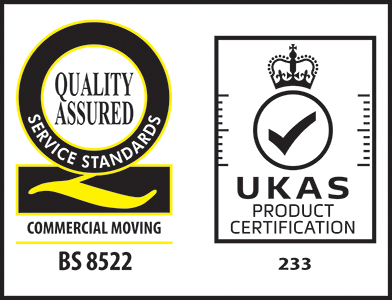In a rapidly changing business environment, growth and an evolving market are compelling many enterprises to relocate. While business owners in the UK need to move to take advantage of a range of opportunities, they must keep their operations intact in the process.
There are millions of businesses in the United Kingdom. Inevitably, circumstances arise that require moving. However, it makes sense to put as much thought into your move as you do in running your business.
Office relocation is very time-consuming. Even worse, it can strain employee and customer relationships, if not done correctly. With a plan, however, you can mitigate risks and make your move as smooth as possible.
Before you start your move, get rid of things that are no longer needed. There’s no need for moving garbage to a new location. Next, organise everything as much as possible, then inventory the things that you’ll need to move.
Now you have an idea of the scope of your move. You can start putting together a plan for moving success.
The following are ten more offices moving tips to help you reduce office relocation stress.
1. Give Yourself Time to Plan
Planning an office move takes more time than you think. If you understand the full scope of the project, you’ll have a better chance of success.
Without a plan, however, you leave everything to chance. You could lose essential office items or have things delivered at the wrong time.
2. Develop a Budget for Your Office Relocation
Of course, budgeting for your move is a top priority. You need to include the cost of storage, for example, if your old lease expires before the new one begins.
You also need to include labour costs for workers who will help with the move. Also, don’t forget costs such as deposits.
3. Scout Ahead
Before you begin, inform your present landlord about the move. Next, obtain a floor plan of your new office space.
It would be best if you had the new floor plan so that you can figure out where everything’s going to go. Also, you need to see if you’ll have to purchase additional equipment for the new location.
4. Organize Your Move
To keep your business units in order, colour code the boxes for each department. Also, label each employees’ office items before the move.
You also need to inform your information technology department about the move ahead of time. Most importantly, however, you need to acquire any licenses and permits required to complete the move legally. You should consult your company attorney about this matter.
5. Ask for Assistance
Once you’ve solidified your plans, call for a staff meeting to talk about the office move. If possible, put together a committee and assign leaders responsible for each department.
At the meeting, you can talk about packing practices and share the new office plans with workers. Also, you can give employees directions to the new location as well as helpful tips about public transport if applicable.
6. Hope for the Best
Every move comes with challenges. Stress is a natural reaction to a problem. There’s no way to avoid it. Acknowledging that you’re taking on a challenge is the first step in preventing stress.
7. Hire Experts
Fortunately, you remembered to budget for a professional office relocation service. Professional movers have experience and knowledge that will make your move go easier.
In addition to lifting heavy items, they can also pack your office goods adequately so that they’ll arrive at the new destination safely. However, it’s essential to hire a company with a proven reputation for providing successful office relocations.
8. Mind Your Health
It’s easy to forget about your health when you’re under pressure. However, you need your rest to think clearly during an office move.
There are many things that you must manage. Make sure you get as much sleep as possible before, during and especially after the move. This is where calling in the professionals will help with having less stress.
9. Communicate with the Team
Even if you were unable to arrange a meeting, you must share important information with your coworkers. Also, you need to make sure that your customers know when and where you’re moving offices.
It’s also essential that your new location can support your business. For example, the internet service providers that deliver service to your new site must have the ability to provide enough bandwidth for your company.
10. Prep to Return to Work
Don’t put so much effort into planning your move that you forget the plan to resume business. Make sure that you have the equipment that you need to return to work activity with as little interruption as possible. A professional moving service will ensure that you have everything set up where you want it to go.
Your new equipment includes, for example, cabling and power supplies that can reach the connections in the new office.
Also, mind the small things such as cutlery for the office kitchen. Missing tea or lunch won’t help workers settle into the new space. With all the big decisions that you must make, it’s easy to forget about the little things.
Work Smart, Not Hard
Every company is unique, and so is every move. What worked one time may not work the next. Still, it would be best if you thought things through. Whatever you do, formulate a plan.
Most importantly, don’t try to complete the entire office relocation by yourself. Choose peers that you trust to share responsibilities. Write things down. You can’t keep everything in your head. Use checklists and check them often.
What’s more, share that information as changes arise. By developing a full plan in communicating with your coworkers, you will have a successful move with as little stress as possible.
Finally, enlist the help of moving professionals. Just as you would seek counsel for areas where your business lacks knowledge, it’s smart to seek advice for your move.
Do you want to plan the best office relocation possible? Contact Company Moves and Storage today to find out how.









